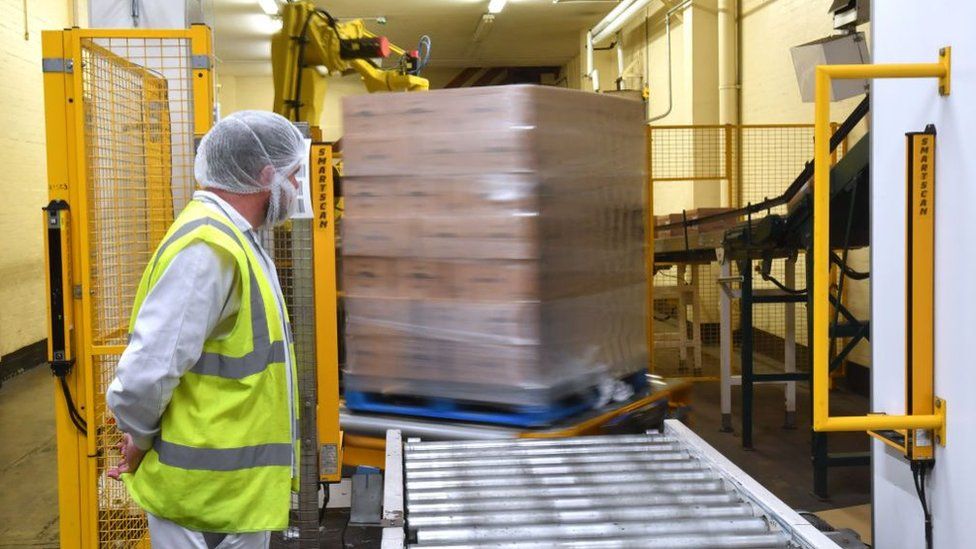The IMF cuts its UK forecast for 2023 and says the global economy is “teetering on the edge” of recession.
 Image source, Getty Images
Image source, Getty ImagesThe UK is set for the slowest growth of the G7 richest economies next year, the International Monetary Fund has warned.
It is predicting UK growth will fall to just 0.5% in 2023, much lower than its forecast in April of 1.2%.
The global economy has shrunk for the first time since 2020, the IMF said, hit by the Ukraine war and Covid-19.
With growth stalling in the UK, US, China and Europe, the world “may soon be teetering on the edge of a global recession”, it said.
The IMF has cut its 2022 global growth forecast to just 3.2% and warned the slowdown risks being even more severe.
It said fast-rising prices were to blame for much of the slowdown, with households and businesses squeezed by a combination of higher prices and higher borrowing costs as policymakers raise interest rates to try to counter inflation.
“The global economy, still reeling from the pandemic and Russia’s invasion of Ukraine, is facing an increasingly gloomy and uncertain outlook,” economist Pierre-Olivier Gourinchas wrote in a blog outlining the international lending body’s latest economic forecast.
“The outlook has darkened significantly” since April, the last time the IMF issued forecasts, he added.
The global economy contracted in the three months to July, which was the first decline since the pandemic hit, the IMF said.
The probability of a recession in the G7 economies – Canada, France, Germany, Italy, Japan, the US and UK – now stands at roughly 15% – nearly four times higher than usual.
The IMF now expects inflation to reach 6.6% in advanced economies and 9.5% in emerging market and developing economies – nearly a full percentage point higher than it expected in April.
“Inflation at current levels represents a clear risk for current and future macroeconomic stability and bringing it back to central bank targets should be the top priority for policymakers,” Mr Gourinchas said.
“Tighter monetary policy will inevitably have real economic costs, but delaying it will only exacerbate the hardship.”


The fallout from the war in Ukraine is being felt in pockets across the world. Soaring food and fuel prices and higher interest rates means the IMF sees more gloomy prospects for all major economies – but it’s the UK that, Russia apart, remains bottom of the pile for 2023.
Brexit may not have helped but it’s our reliance on fossil fuels – they make up 75% of our energy mix, compared to just over half of the EU’s – that’s made us particularly vulnerable to this shock. Those prices are determined on international markets but affect us all. This report comes on the day that, with the energy price cap set to top £3,000 in October, a committee of MPs warns that further government help for households may be needed.
But the IMF is among those economists who’ve noted that the UK faces more fundamental issues than the current crisis, with living standards having dropped behind many competitors over the last 15 years, something many attribute to a lack of investment in skills, equipment and infrastructure. Officials from the IMF have previously told me that one way to remedy that would be to raise, not lower taxes, to fund more investment.

The US saw the steepest downgrade of any country for 2022. The IMF cut its growth forecast for the world’s largest economy to 2.3% this year, from 3.7% previously, and to just 1% in 2023.
Meanwhile growth in China is expected to fall to 3.3% this year, the slowest rate in nearly four decades, as the country wrestles with new Covid lockdowns and a property crisis.
Questions about the reliability of Europe’s natural gas supplies from Russia, as well as political unrest generated by high food and fuel prices, are among the risks the global economy is facing in the months ahead, the IMF said.
It warned that in a “plausible” scenario, in which only some of those risks materialise, like a shutdown of Russian gas flows to Europe, global economic growth could fall to 2% next year – a pace the world has fallen below just five times since 1970.